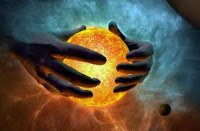
Have you ever created something new intellectually? I mean have you ever really,
seriously advanced thought in some area?
If you think about it, much of what we all do (or at least much of what I do) is derivative, rehashing what has already been done. Certainly in undergraduate school, any "research" that I did was really an exercise in collecting, repackaging and reselling what other "experts" had done. Even in those areas where I was expected to provide a fresh insight into the work of others, I was still not creating anything new. At best, I might have said something slightly original about someone
else's work.
In graduate school, it wasn't much better, really. I was expected to have developed an expertise for my area of study, and I was (hopefully) able to make connections and inferences across works and across subject areas that were perhaps a bit more sophisticated than I would have pulled off in undergraduate school. It felt like hard, creative work at the time, but I know better now, all these years later. Even when completing a thesis at the graduate level, it was still more of the same, riffing on more of the same. It was all about what moderately unique twist I could come up with on what others had already done.
Now, in the real world, what do we really create? Certainly I write thousands of words a week and produce original processes, plans and ideas all the time. Or at least it seems like I do. But I think that someone doing a forensic analysis of my work after the fact would conclude that nothing I do is really anything new. I'm still retracing well-worn paths and building familiar structures.
Does anyone truly "create" any more? What about people studying at the PhD level? The requirement for that degree is supposed to be a true, original contribution to the literature in that field of study. . . something that advances the debate and provides primary research for graduate students to rehash and for other professionals to build upon. Are
PhDs where the creation in academia happens?
And what about the creative ones among us in the real world? Those artistic ones among us. Surely they create, right? Original fiction and non-fiction. Original illustrations, photographs, paintings, and sculptures.
Is that really who creates?
PhDs and artists? What about everyone else?

